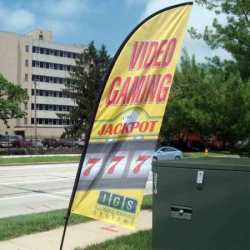
Peoria’s Leaders Plan a Tuesday Night Meeting to Discuss the Local Video Gambling Cafes
City leaders in Peoria, Illinois were alarmed to learn they have video-gambling cafes in their city. The gaming machine operations are considered legal under a 5-year old Illinois law, but the people who passed that law never envisioned how that law is being used now.
When the law was first instituted, the idea was to give local business owners of bars and restaurants a chance to compete in a tough economy with an increasing cost of living.
Gaming Machine Laws Did Not Anticipate Cafes
Peoria City Councilman Eric Turner says he certain never imagined a gaming venue like the ones which now exist in the city. Turner says his colleagues on the city council ever imagined such establishments would exist–at least most of them didn’t.
A video-gambling cafe is a relatively new type of gaming location which is popping up across America. Officials in at least 20 states have reported these type of gaming establishments in their communities. They look like most any other business in a strip mall or shopping area. Most people couldn’t tell one from a regular cyber-cafe.
What Is a Video Gambling Cafe?
In fact, that’s exactly what video gambling cafe looks like from the outside: a cyber-cafe. These establihshments have computers set up for Internet access. In a regular cyber-cafe, a person logs on to their email address and correponds with friends and business contacts. They might surf the net for leisure or information. Some might play online games.
The state of Illinois says the virtual gaming machines being used are legal. Local communities can make laws against such gaming parlors, but it’s hard for local law enforcement to spot such operations. The virtual gaming cafes look like a cyber-cafes, except every player in the establishment is playing a casino-style game similar to slots.
Licensing and Regulation
The problem state and local authorities have with such establishments is they are unlicensed and unregulated. That means gaming patrons don’t have the usual legal protections they would in a casino. Casinos are given the legal right to operate games with a house edge–an advantage which all-but-assures the casino will make a profit over time. The tradeoff is the casino must maintain a house edge at a certain level, so the games are not seen as unfair or predatory.
In an unlicensed gaming venue, no such protections exist. This also means that gamblers are not likely to take their complaints to the authorities, since these players often assume they’re engaging in illegal gambling, themselves. Many times when local authorities learn about video gambling cafes in their communities, it’s from disgruntled customers or concerned parents.
Lost Tax Revenues
Beyond any moral or social reasons, governments do not like unlicensed gaming, because it represents a lot of lost tax revenue. In certain locations, operators make sure to pay their taxes, but other operations do not. Also, the gamblers are not as likely to pay taxes on the money they won, because it’s “under the table”.
In states like Ohio and California, where video gaming parlors have appeared in large numbers, these lost taxes are significant. It is suspected between $2 billion and $3 billion per year is lost in tax revenues to these cafes.
Peoria Gaming Cafes
In Peoria, local laws might be changing soon. A meeting is being held this Tuesday night in which local leaders and residents will discuss new regulations. In the local video gambling cafes, the operations are selling minimal amount of alcohol. This is concerning, even if some of the operations are small–as few as 5 machines.
Peoria’s councilmen are concerned that the operations sound family-friendly. They have names like Annie’s, Emma’s, or Dotty’s. Again, it should be noted that the laws are not being broken, technically. The spirit of the law is being broken, according to men like Drew Cassidy, the chairman of the Peoria Liquor Commission.
Drew Cassidy says the gaming machine laws was instituted to give bars, restaurants, and other Mom-&-Pop establishments more revenue, while giving the state additional tax proceeds. The out-of-state operators are making a travesty of the law, says the Liquor Commission chairman.
Mr. Cassidy told the newspaper, “The out-of-state people just sat on the sideline. They were quiet. They waited until everything was in place, and they ran in in force and started opening them like crazy.’
